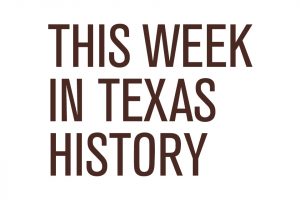W
ith independence about to be swapped for statehood, Texans packed the polls on Sept. 2, 1844 to pick a president for the fourth and final time.
The year before the Lone Star Republic’s last election, Texans could not have imagined that they would be forced to choose between Anson Jones and Edward Burleson. Even though each man had held important positions, both were political small fry clearly not cut out to be in charge. But when more qualified figures refused to run, the nominations of their respective factions went to Jones and Burleson by default.
In the absence of formal parties, the voter’s preference was dictated by his feelings for or against Sam Houston, the controversial incumbent considered a cinch for reelection in 1844. To challenge the General, the loose-knit opposition tried to persuade their hero, ex-president Mirabeau Lamar, to come out of melancholy retirement, but the dream race of Houston versus Lamar was not to be.
By the summer of 1843, Houston supporters already suspected that for his own inscrutable reasons Old Sam had decided against a third term. Thomas Rusk, the perennial second fiddle, also declined the honor and recommended secretary of state Anson Jones.
Originally from Massachusetts, the physician settled in Texas three years prior to the Revolution. After serving as battlefield surgeon for the rebels, Dr. Jones was a member of the First Republic Congress before Houston appointed him minister to the United States in 1838.
While 46-year-old Jones combined diligence with intelligence, he lacked the charisma and clear-headed pragmatism so essential to political success. Habitually petty, short-sighted and generally disagreeable, he had no personal following in spite of an impressive public record.
However, Jones did not allow his unpopularity to cool his burning ambition. Hearing that Rusk had taken himself out of the picture, he quickly declared his candidacy, an announcement for the most part ignored due to Houston’s strange silence on the subject of another term.
In keeping with the curious tradition of the times, Texans in 1841 had again selected a vice-president totally at odds with his superior. As if to achieve a bizarre balance, the electorate gave Houston a subordinate he despised – Edward Burleson. Rarely did the two speak, and when they did the conversation always ended in a shouting match.
As expected, Vice-President Burleson jumped feet first into the presidential race. Although a lone wolf throughout his career, the well-known Indian fighter courted the Lamar camp in hopes of fattening his slim chances.
This strategy was spectacularly unsuccessful until Mirabeau Lamar stunned the faithful by suddenly endorsing Burleson at a rally in January 1844. This surprise move scared off several would-be contenders, who scrapped their plans rather than buck Lamar.
Disgruntled elements in the different factions mounted last-minute movements to draft alternatives to Jones and Burleson. Houstonites approached speaker of the house Kenneth L. Anderson only to learn he had designs on the second spot, while the best Lamar loyalists could do was eager nonentity Abner Lipscomb. But Texas was not ready for a president named Abner, and the grass-roots candidacy withered on the vine.
Sam Houston put off giving Anson Jones his blessing until a month before election day. Maybe it took him that long to make up his mind, or perhaps he too was holding out for a better alternative.
Since the anointed aspirants saw eye to eye on every issue, the contest should have been a ho-hum affair. But an energetic assist from the hard-hitting press transformed the dull campaign into a Houston-Lamar showdown with the usual mud-slinging Texans loved.
Editorials like the following jewel from La Grange set the tone: “Caligula, the depraved and worst of all the tyrants that ever ruled Rome, showed his contempt by making his horse a consul. Gen. Houston, thinking the people of Texas in a like condition, evinces a much greater contempt for them by wishing to impose Dr. Anson Jones upon the Republic as President — a less noble animal.”
Catching his share of abuse, Burleson was saddled with every conceivable shortcoming of the Lamar presidency despite having nothing at all to do with that administration. His meager education and back-country ways spurred mean-spirited charges that he would embarrass the Republic.
As secretary of state, Anson Jones personally counted the ballots that trickled in from the far-flung polling places. He must have relished the task, as the early returns gave him an insurmountable lead.
But Jones’ 16 months as the last president of Texas was anything but pleasant. Then in 1858 he somehow got it in his head that state lawmakers would select him to serve out the senate term of Thomas Rusk, who had committed suicide. When they didn’t, Anson Jones followed Rusk’s example and took his own life in a Houston hotel room.
Autographed copies of “Murder Most Texan,” Bartee’s latest book, are still available. Order yours in the “General Store” at barteehaile.com or by mailing a check for $26.65 to Bartee Haile, P.O. Box 152, Friendswood, TX 77549.






